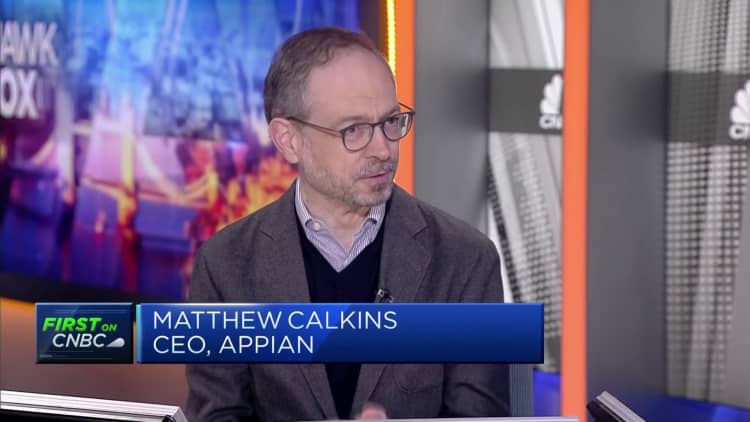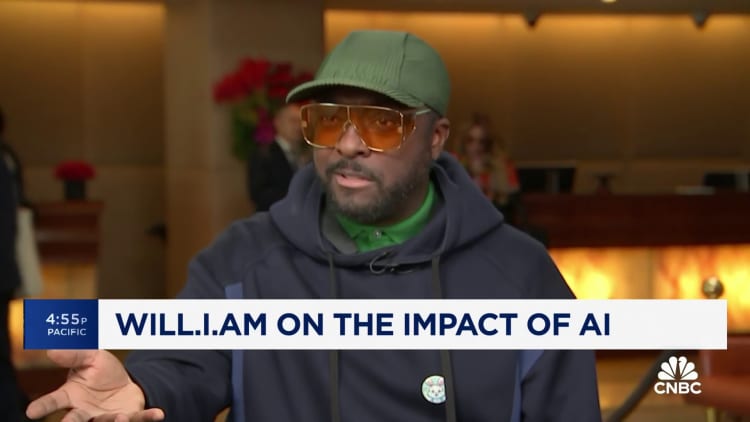Just_super | E+ | Getty Images
Big technology companies are consuming as much data as possible to become winners in artificial intelligence — but that’s not necessarily what will define winners, according to the boss of software giant Appian.
Matt Calkins, co-founder and CEO of Appian, said that though internet giants like Microsoft, Amazon and Google are spending billions on the tech, ensuring success in AI is “not just about money.”
“AI is not a place where money makes more money,” Calkins told CNBC in an interview at its London bureau on Tuesday.
Calkins was referring to the high-profile deals companies like Microsoft and Amazon are agreeing with ambitious and fast-growing foundational AI model makers, like OpenAI and Anthropic.
Microsoft has invested a total of $13 billion in OpenAI, a deal that entails Microsoft getting a stake in OpenAI and the latter adding its GPT language models to the Redmond, Washington-based technology giant’s Azure cloud computing platform.
Microsoft has struck a similar deal with Mistral, taking a 15 million euro ($16 million) stake in the French AI firm.

In OpenAI’s case, Microsoft has a nonvoting observer sitting on the firm’s board.
That happened after a shocking series of events last year that saw the CEO of OpenAI, Sam Altman, temporarily ousted, before later returning after hundreds of OpenAI employees threatened a coup to join Altman at Microsoft.
Separately, Amazon has invested a whopping $4 billion into U.S. AI firm Anthropic, which is behind the Claude AI system. Amazon holds a minority stake in Anthropic but no board seat.
Google, too, has committed billions of funding to Anthropic, agreeing last year to invest up to $2 billion.
Scrutiny from UK regulators
British regulators are assessing whether deals agreed by Microsoft and Amazon with foundation AI model startups may constitute effective mergers that could lead to a substantial reduction of competition.
Microsoft denies its deals with OpenAI and Mistral and hiring from Inflection constituted mergers. Amazon says its partnership with Anthropic constitutes a limited corporate investment, not a merger.
This is a market for the clever. The fact that you’ve got enough money to buy, or buy a piece of, Anthropic or Mistral or any of that, that’s impressive. But AI may not be a ‘winner take all’ market.
For Calkins, whether or not those deals qualify as mergers that threaten competition in AI, there will be room for innovators to thrive.
“If coalitions won the AI race, Google would have won by now,” he said, calling out the U.S. tech giant’s $500 million takeover of British AI lab DeepMind.

Far from it, Calkins contends — instead, he thinks Google lost out to Microsoft early on when it comes to generative AI, which threatens to upend the fabric of Google’s search business.
It follows a blunder that saw Google’s Gemini text-to-image generator produce inaccuracies in historical pictures that went viral online. Google paused image generation of people to refine the tool. CEO Sundar Pichai called the debacle “unacceptable,” according to an internal memo obtained by CNBC in February.
Google was not immediately available for comment when contacted by CNBC.
“This is a market for the clever,” Calkins said. “The fact that you’ve got enough money to buy, or buy a piece of, Anthropic or Mistral or any of that, that’s impressive. But AI may not be a ‘winner take all’ market.”
“There’s going to be different AI algorithms for different purposes, and they are going to be much more or less valuable, depending on whether and how you’ve loaded your own data into it,” he added.
Calkins said that the only way for AI systems to become truly clever and useful is by being capable of understanding what we want from them for use in our everyday lives.
“The best AI will be the AI you put your data into, not whoever bought the biggest stack,” he said.
Europe has ‘head start’ with regulation
Calkins said the AI race today has become more about “how much data can you eat” than how smart the AI actually is.
Big Tech companies have been “doing anything they can in order to get the most data,” Calkins said. “But that game was almost up,” he added.
That’s because, absent any concrete laws to prevent Big Tech’s guzzling up of data to prevent privacy infringements, those companies were allowed to obtain the data they needed to train their models.
Calkins said he’s disappointed with a lack of progress on regulation of AI in the U.S. at a federal level.
Europe has a “head start” on AI in a way “because there’s emerging clarity on regulation,” he told CNBC’s “Squawk Box Europe” on Tuesday.
“In the United States, it’s not clear, partly because the government has been a little bit too friendly to Big Tech,” he said.
The European Union officially approved its AI Act, the first comprehensive law governing artificial intelligence, in March.
Calkins said businesses need clarity on how they can use AI safely and guarantee things like protection of intellectual property and users’ personal privacy
“In Europe there’s a natural skepticism … over here, we have regulations that push back against American Big Tech firms,” Calkins said.
“I would suggest it’s time for that again, with fair use of copyrighted information. We need a clear playing field, we need to understand what data we’re allowed to use.”